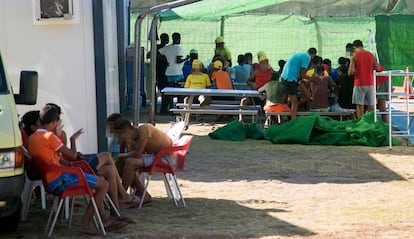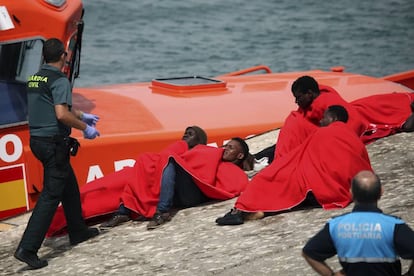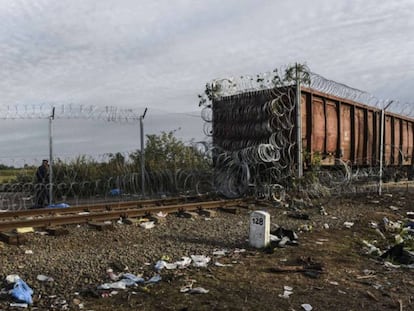Young migrants housed in Spanish campground as bed shortage bites
Surge in arrivals along the coast of Tarifa leaves authorities struggling to find them proper housing


A campground at the popular beach of Valdevaqueros, on the coast of Tarifa in southernmost Spain, has become a makeshift shelter for over 60 underage immigrants who landed here as part of a large influx of undocumented arrivals.
The move is being described as a stopgap solution caused by the overcrowded conditions at the official juvenile centers run in Cádiz province by the regional government of Andalusia. Unions and non-profit groups are calling it “an inappropriate remedy.”
When their expectations are not met, they run away and that’s what we should worry about
Michel Bustillo, activist
Over the course of just 16 hours on August 17, as many as 439 migrants arrived at Valdevaqueros after departing from the northern coast of Africa, across the Strait of Gibraltar. Of these, 39 are underage – most are 15-to-17-year-olds from the Maghreb region, which includes countries like Morocco, Algeria and Tunisia. This past weekend, another 74 migrants arrived in Cádiz province, including more minors.
The conditions at official juvenile centers are increasingly overcrowded in the face of growing migrant flows into southern Spain in recent months. Classrooms have been turned into makeshift dorms and there is a shortage of staff, according to union reports.
Now, with the most recent uptick in migrant numbers, regional officials have resorted to using a section of the Jardín Las Dunas campground to temporarily house the newest arrivals. The youths are sleeping in four tents equipped with bunk beds in a campground annex normally used as a parking area.

Regional officials say that these youngsters are receiving “the same services as in a center,” including Spanish classes, which are being taught on the porch of a nearby restaurant.
“Ever since it emerged that they are here, we’ve been flooded with calls from locals offering food and clothes,” says Kiko Cárdenas, a campground employee. “There is a lot of solidarity in Tarifa, we’re already used to immigration.”
But non-profits are criticizing a lack of information regarding the status of the juvenile migrants. “I think it’s dramatic, the way nobody is being told how they’re doing, and the fact that a campground was used, no matter how much of an emergency it was,” says Michel Bustillo, of the group Voluntarios por un Mundo Mejor (Volunteers for a Better World).
Ever since it emerged that they are here, we’ve been flooded with calls from locals offering food and clothes
Kiko Cárdenas, campground worker
José Porras Naranjo, a public services official at the UGT labor union, has been “denouncing for over two months the situation of juvenile centers in Campo de Gibraltar, which are above saturation point and housing three times as many teenagers as they are equipped to do.”
Faced with a growing influx, the regional government has already extended its housing stock by 100 more units, reaching deals with foundations and outside firms to manage apartments in Cádiz, Almería and Granada.
Between January and mid-July, Andalusia has provided accommodation to 2,000 underage migrants, a 60% rise from 2015. An investment of €1.4 million was made in early August, in the expectation that it would cover the housing needs of underage migrant attention until March 2018. But the resources have become obsolete in the space of two weeks.
Regional government sources said that the minors currently at the campground will soon be transferred to official centers, which are currently being expanded. But no official date has been provided.
Some activists criticize the lack of a long-term plan for these minors, who often “drop out of the system” after being “in storage” for a while, says José Carlos Cabrera, of the El Cobre Center in Algeciras.
“When their expectations are not met, they run away and that’s what we should worry about,” adds Bustillo. “When they leave, they are at the mercy of the mafias and their traps. These are kids who have been through a lot, and they could fall.”
English version by Susana Urra.
Tu suscripción se está usando en otro dispositivo
¿Quieres añadir otro usuario a tu suscripción?
Si continúas leyendo en este dispositivo, no se podrá leer en el otro.
FlechaTu suscripción se está usando en otro dispositivo y solo puedes acceder a EL PAÍS desde un dispositivo a la vez.
Si quieres compartir tu cuenta, cambia tu suscripción a la modalidad Premium, así podrás añadir otro usuario. Cada uno accederá con su propia cuenta de email, lo que os permitirá personalizar vuestra experiencia en EL PAÍS.
¿Tienes una suscripción de empresa? Accede aquí para contratar más cuentas.
En el caso de no saber quién está usando tu cuenta, te recomendamos cambiar tu contraseña aquí.
Si decides continuar compartiendo tu cuenta, este mensaje se mostrará en tu dispositivo y en el de la otra persona que está usando tu cuenta de forma indefinida, afectando a tu experiencia de lectura. Puedes consultar aquí los términos y condiciones de la suscripción digital.

